
FIRST-QUARTER-1995
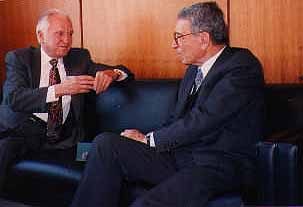 |
Walter Hickel, Chairman
of the Northern Forum, Discussing his UN address
Why war? Why not big projects?
with UN Secretary General Boutros Boutros-Ghali.
|
Inside
Dear GENI Friend;
The GENI initiative gained global attention
this past year. Many world leaders now concur
with our bold promise--GENI:
A Solution to Global Problems. While
we continue to research the cost/benefits of
projects on every continent, it is clear that
the interconnection of remote renewable energy
resources will improve the quality of life for
everyone.
In this issue, we highlight several endorsements
of this vision and the advocation of very real
projects:
- Walter Hickel, ex-Governor of Alaska
and Secretary General of the Northern Forum,
addressed over 1000 non-governmental organizations
at the opening session of the United Nations
with
Why war? Why not big
projects? The GENI proposal is his
prime example of a project to build peace
in the world.
- In the Washington Declaration between
King Hussein of Jordan and Prime Minister
Rabin of Israel, both agreed to the linking
of communication and electrical networks as
economic linkages to further peace
in the Middle East.
- Egypt's Energy Minister, M. Maher Abaza
keynoted the plenary session of CIGRE
(International Conference on Large High-Voltage
Electric Systems) with
Africa-Europe
Electrical Interconnection and the Prospects
of Worldwide Interconnections. This
proposal would tap the abundant hydro potential
of central Africa for use within the continent,
and export excess power to Europe and the
Middle East to displace more polluting fossil
generation. Dollars for both debt repayment
and development would flow back into Africa.
GENI received global attention at the UN
Population and Development Conference in Cairo.
Our exhibit drew critical acclaim as populations
experts reviewed the Quality
of Life vs Electricity Consumption charts.
Showing a definite correlation
between energy use and living standards,
you'll find these charts on pages below.
Your support
has enables us to push this global solution
onto the agenda of many world leaders. We need
to reach decision makers in every country, and
I invite you to share this information with
your elected representatives and business leaders.
If you need further information, just write,
call, or e-mail us (internet:info@geni.org).
If you would like to help fund this vision into
reality, please do so.
In partnership for the planet,
Peter Meisen
Executive Director
|
|
GENI DIRECTORS AND OFFICERS: Len Bateman,
Sara Beattie, Lowell Blankfort, Anthony Davis,
Anthony Davis, Graeme Edwards, Joe Falcon, Floyd
Geis, Nyhl Henson, Bill Shopoff, Joanalys Smith,
Kerry Zurier
GENI EXECUTIVE DIRECTOR: Peter Meisen
GENI ADVISORS: Raghbir Basi, Milton
Byrd, David Cline, Mike Fisher, Mark Victor
Hansen, Robert Kiyosaki, Terry Lipman, Karen
Morgan, Robert Muller, Glenn Olds, Malcolm Roberts,
David Steven, Marshall Thurber
Newsletter produced
by Writing by Design, Jamul, California
|

|
Every
gun that it made, every warship launched, every
rocket fired signifies, in the final sense, a
theft from those who hunger and are not fed, those
who are cold and are not clothed. This world in
arms is not spending money alone. It is spending
the sweat of its laborers, the genius of its scientists,
the hopes of its children.
President
Dwight D. Eisenhower
|
An address to the 47th annual
United Nations Department of Public Information/Non
Governmental Organization Conference, Sept 22, 1994
The following is an excerpt of a presentation
delivered by Walter Hickel, ex-Governor of Alaska
and Secretary General of the Northern Forum.
Today I bring you a proposal for
the next century. I commend it to all nations and
NGO's for their best thinking and creativity.
Philosophers have talked for centuries about building
a new world. Today we are meeting to discuss building
peace. My conclusion is that to build
a new world--to build peace--we must literally build
it.
To build a new world — to build peace —
we must literally build it.
Historically, the world's most cynical leaders have
used war as an economic strategy. War puts people
to work and gives them a purpose. War concentrates
the thoughts of a nation, making it think and act
as one.
But why war? Why not big projects?
After all, war is just a big project.
My idea is not new. It's as old as the pyramids
and aqueducts of Rome.
The late inventor Buckminster Fuller conceived of
a global energy network, linking the industrial and
developing world with an energy grid. Existing electrical
generators, unused during the night in the North,
can be tapped--at the speed of light--to bring poverty
fighting power to the South.
Two billion people live without electricity today.
Show me any area in the world where there is a lack
of energy, and I'll show you basic poverty. There
is a direct tie-in between energy and poverty, energy
and war, energy and peace.
While Fuller's global concept may seem like science
fiction, electrical interconnections between regions--and
even continents--can and must be tackled now. This
can be a vast and visionary undertaking--worthy of
our generation.
Some people may ask, Where will
the money come from? I say money is not the problem.
There's always enough money to go to war. It all depends
on our priorities.
In some quarters, big projects today are notpolitically
correct. Many sincere people believe small
is beautiful and wilderness is
the world. But we in the Far North understand
the power of a big project to change society. Russia
did it with the 6,500 mile trans-Siberian Railway.
Alaska did it when we built the largest project in
the history of free enterprise, the trans-Alaska oil
pipeline. It mobilized our people, gave them a challenge,
and a goal.
So, al we approach the end of this century, let's
agree on some big projects and build them. Let's link
up the world's excess electrical generating capacity
with those most in need."
This can be a vast and visionary undertaking
— worthy of our generation.
Eng. M. Maher Abaza, Egypt's
Minister of Electricity and Energy
The following conclusions are from the keynote
presentation to the International Conference on Large
High-Voltage Electric Systems (CIGRE)August
28, 1994. 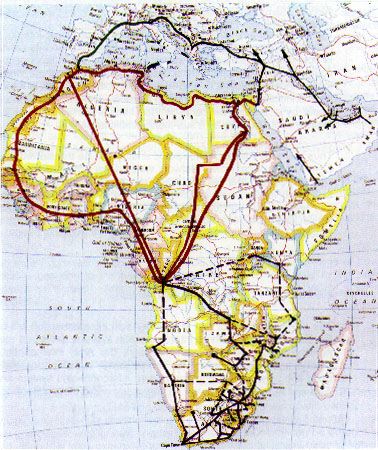
- There are abundant potentials of hydroelectric
energy in several parts of the world which are not
yet harnessed. It is estimated that these potentials
are of the order of 13,000 TWh/year, only about
15% are in operation. Development of these potentials
and transmitting their energy to needy load centers,
may prove to be more economical, in certain cases,
than generation by thermal power plants. It is worthy
to mention that the total world electric energy
consumption is estimated to be about 12,000 TWh
(Terawatt hours) during the year 1990, which is
less than the potential of hydro-energy.
- The development of the world's hydroelectric potentials
and the construction of long distance transmission
lines for the transport of the bulk hydroelectric
energy from its distant sources to the utilization
center is the aim of environmentalists as well as
hope for the people of developing countries. The
clean hydroelectric energy would replace electric
energy produced by burning fossil fuels. The revenues
from the export of the renewable hydro-energy would
contribute to the sustained development of the producing
countries.
- In Northern Africa, the first step towards the
fulfillment of these aims and hopes has started
by the ratification of the agreement between Zaire
and Egypt for the utilization of the potentials
of the Zaire River for the benefit of some African
countries. Exporting the excess energy to Europe
is also considered.
- It is proposed that successive steps should be
taken for the development of the exploitable hydroelectric
potentials in Northern Africa, which are estimated
at about 1000 TWh per year. A strong high voltage
transmission system is to be built to interconnect
the hydroelectric projects together, as well as
to provide strong ties to neighboring continents,
(Europe and Asia) for the export of blocks of electric
energy. Through the collective generation and export
of hydroelectric energy, sustained development of
countries in Northern Africa would be achieved.
The revenues from electricity exports would pay
back the investments in the power projects and also
provide financing for sustained economic and social
development.
- Environmental issues caused by the combustion
of fossil fuels are the present concern of the world.
With the encouraging results of the Egypt-Zaire
Interconnection study, it has become interesting
to extend the interconnection to Europe for the
import of clean hydroelectric energy to replace
fossil fuel burning power plants.
- The idea of the power pool of the Mediterranean
Sea countries represents the first step in the integration
of the European electricity system with the developing
system of the countries of Northern Africa. The
fulfillment of this integration will make it possible
for increasing imports of clean electricity from
Africa.
- It is proposed that the electric utilities in
the two continents of Europe and Africa should work
closely and cooperate in the implementation of the
hydroelectric projects in Northern Africa and the
integration of the power system of the two continents.
- CIGRE, being the most important organization for
large electric systems, would adopt the subject
of the integration of the power systems with and
between continents for the transport of the hydroelectric
energy from it far sources to the load centers.
The objectives would be the alleviation some of
the world's environmental problems. The sustained
development of countries in Africa, Latin American
and Asia, where hydro potentials are available and
could be exported to the industrialized countries,
can be achieved.
GENI's participation at the
United Nations Conference on Population and Development
(UNCPD)
in Cairo Egypt, September 1994
While the issues of family planning, women's rights
and abortion took center stage at the Population and
Development conference, many global leaders recognized
that many of their action plans could not be implemented
without electricity. World Bank President Lewis Preston
stated that over two million people today have no
clean water or electricity.
World Bank President Lewis Preston stated that
over two million people today have no clean water
or electricity.
GENI's research into the correlation between electricity
and quality of life opened the eyes of many development
experts. The charts below reveal a clear relationship
between living standards and electricity consumption.
Increasing availability and use of electricity is
generally associated with a higherquality
of life. While different people and cultures disagree
on how to define quality of life, several measures
are commonly used. Here we will examine four of these--life
expectancy, infant mortality (the number of children
per 1000 live births who die in their first year),
adult literacy rate, and the availability of safe
drinking water.

Dot sizes represent the population
in millions. The top 11 named countries comprise
two thirds of the world's population.
Thanks to Walt Venable for this
research and graphics presentation.
|
Life expectancy definitely increases with energy
consumption. Once a nation reaches 2000 kWh per
capita, the average life expectancy is about 75
years. China's emphasis on controlling birth rates
and improving health care has resulted in a higher
than average life expectancy based on their energy
consumption. The SE Asian nations could significantly
improve life expectancy with increased availability
of energy.
The pattern is the same for each chart--those people
having less than 1000 Kilowatt-hours/capita/year remain
in daily survival. Today, this constitutes 60% of
the world's population. Approximately 20% of the population
falls between 1000 and 2000 kWh/capita/year,
and these people live in many of the newly industrialized
economies of Latin America, Middle East and Southeast
Asia.
Only 20% of the world (1.1 billion people) have more
than 2000 kWh/capita/year, which appears to be a clear
threshold between developing and developed societies.
Dr. Graeme Edwards, a medical doctor and GENI Board
member, emphasized the need of electricity for the
educational programs of women and children, and better
health care services (i.e. refrigeration of vaccines
and running diagnostic equipment). From
sun-up to sundown people are spending their time handling
basic survival needs of fetching water, collecting
firewood, and feeding their families. In developed
countries, electrical energy provides these services.
The World Health Organization and many hunger
response groups have identified an Infant Mortality
Rate (IMR)
of 50 as the "point of no return" to
a hungry nation status. No country which has achieved
this level has ever gone back to an IMR of 50+.
China's emphasis on controlling birth rates and
improving health care has resulted in a lower
than average IMR based on their electricity consumption.
Many nations could significantly decrease their
IMR with increased availability of electricity.
Electricity provides the essential infrastructure
for clean water, food preparation and refrigeration,
and waste disposal.
The situation becomes critical when
you consider that in 10 years, projected population
data suggests that over half of the world's population
will be living in cities--and in many cases severely
straining already overburdened infrastructures, Dr.
Edwards emphasized.
These people will need electricity
for schools, health services, transportation and communications
as well as business and industry. This is a huge requirement
in places where local renewable sources of energy
is not easily tapped. Fortunately the electricity
industry already has the technology to transfer the
bulk quantities of power we are talking about to the
places where you and I choose to live and work.
Clearly, small and medium size energy projects are
also required to meet the demands of rural populations.
Research and history show that as living standards
increase, insurance births of
developing nations decrease.
Research and history shows that as living standards
increase, "insurance births" of developing
nations decrease.
When you realize that we are now adding 250,000 people
per day to the planet, it becomes essential that we
examine solutions that can meet the growing societal
demands at a scale that is required. The linking of
renewable energy resources around the world can meet
that need.
As energy consumption reaches 1000 kWh per
capita, it appears that nations can anticipate
at least a 50% literacy rate. At 2000 kWh per
capita, they can expect over 85% literacy rate,
and at 4000 kWh per capita, virtually 100%.

Many countries did not report information on safe drinking
water, hence some primary nations are missing from this
chart. However, it is evident that an increase in energy
consumption per capita brings sewage disposal and a
greater ability to store, pump and filter water. Once
a country reaches 2000 kWh per capita, they can expect
that over 90% of the population will have potable water.
GENI's Peter Meisen and Dr. Graeme Edwards discussed
the GENI mission with Vice President Al Gore and U.S.
Undersecretary Tim Wirth in Egypt. They were also
interviewed by the BBC,
Middle Eastern Times, Nile TV,
and had coverage on CNN,
Globe and Mail, and many others.
A Buck-A-Day for Bucky
 1995
is the 100th year since the birth of Dr. R. Buckminster
"Bucky" Fuller on July 12, 1895. 1995
is the 100th year since the birth of Dr. R. Buckminster
"Bucky" Fuller on July 12, 1895.
Buckminster Fuller's Vision of "Spaceship
Earth" is the inspiration for GENI's work.
GENI's vision is: For all people to have access
to ecologically sustainable energy.
We ask you to join us to make this vision real
in the world — to be a GENI-us, as Bucky stated
we were all born to be.
Starting today, GENI invites you to commit a minimum
of just one dollar a day — $30 a month, or one
payment of $US 360 in support of GENI's work this
year — in honor of Bucky.
YOUR INVITATION TO BE A GENI-us
"How do we make the world work for 100% of
humanity inthe shortest possible time without ecological
damage or the disadvantage to anyone?" Fuller's
World Game™ Purpose Statement
Contributions are tax deductible
in the USA. Supporters receive the monthly report:
"Buckminster Fuller and Your Business"
Funding needs for 1994: $1,000,000.
Your generous support
is requested.
Project for 1995: Computer
Simulation Model Creates the scenario
of "innterconnectiong renewable resources around
the world," and compares this to other accepted
models that anticipate a moderate push towards renewable
and a business-as-usual scenario. This is an essential
tool to sell the engineering and financial communities
on the project.
Project for 1995: One-Hour
Documentary/Film GENI already has two outstanding
15-minute videos: "What If... A New Global Option"
and "A Win-Win Solution," that have been
viewed around the world. An independent production
company isproducing a one-hour piece for international
television broadcast. The video will educate millions
around theworld about this synergistic opportunity.
Request:
Request a GENI Video
Discuss this proposal and share the GENI video
with friends and business associates. (Use the Tell
your friends about this page feature below)
Write
a letter to your political leaders, especially
the Presidents of the U.S. and the U.S.S.R. and the
U.N. Secretary General
Contact
your local media regarding a feature story
on GENI
Arrange
a presentation for GENI at your group's luncheon
or trade conference
Contribute
money or skills to forward the education of this
global opportunity
GENI Support
and Products
New GENI Computer Animation
|
- GENI
Video:
What if... a new global option
This 15 minute video has been seen
around the world. Designed for the general public,
it's the best overview of the GENI Initiative. Introduction
by John Denver.
- GENI T-shirts (no longer offered)
"Connect the World with GENI"
— three color shirt along with Dymaxion™
Map and Grid is guaranteed to get attention and
conversation. White shirts with Map in blue and
yellow, Grid and print in red.
- GENI
Brochures
A concise statement on GENI, as well as the benefits
in the areas of economics, the environment, international
trade and cooperation, hunger and overpopulation.
This piece will explain GENI to your firends in
3 minutes.
- GENI
Source Document and Placement on the GENI
Mailing List
You'll receive documentation and
support literature on the Global Energy Grid proposal,
priority mailing of hardcopy GENI Newsletters, and
monthly e-mail updates on the status of this discussion
around the world.
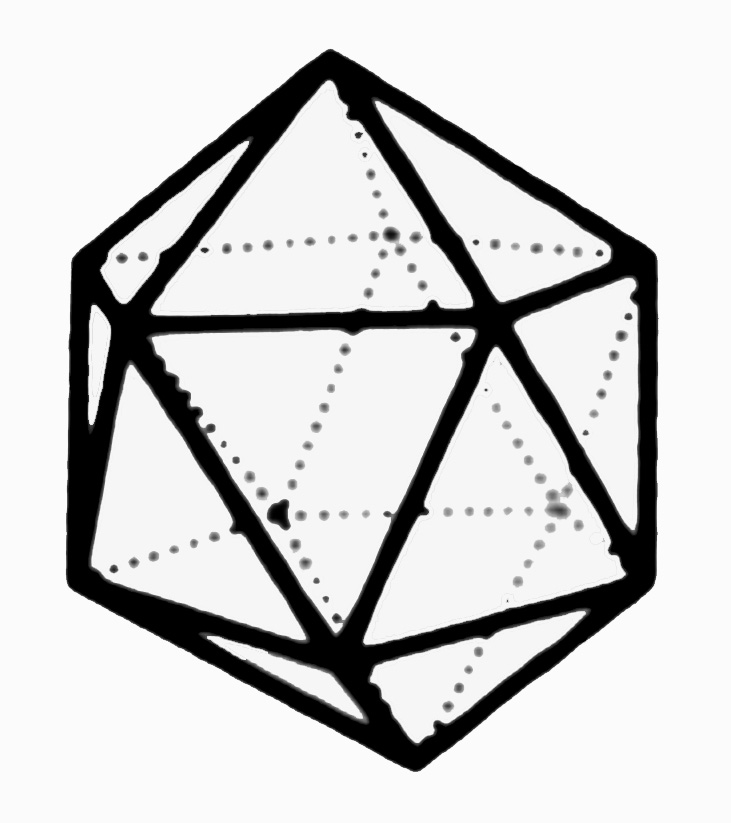 Dymaxion™
Globe Dymaxion™
Globe
Folded from the Dymaxion™ Map,
this four-color 6" globe generates conversation
on global issues and solutions.
- GENI
Video:
A WIN-WIN Solution
A 15 minute discussion by ten delegates
who participated in the International Workshop in
Winnipeg, Manitoba, Canada in July 1991. The consensus
statement strongly corroborated the GENI initiative
as very credible. It's a win-win
proposal for everyone involved. Joe Falson
- New
GENI Key Ring
New key ring has a blue and green
marble globe.
- Reports,
Maps, Paper Submissions, and Graphs
Complete set of documents from International
Workshop, Winnipeg, Manitoba, Canada July 1991 —
and Russian/Alaskan Meeting — Anchorage, Alaska,
January, 1992. $75 donation.

The Buckminster Fuller Institute
owns all rights to the Dymaxion™ Map
design. The word Dymaxion™ and the
Dymaxion™ Map design are trademarks of
the Buckminster Fuller Institute. The Map
is copyrighted by the Buckminster Fuller Institute,
1938, and is used here by permission.
|
|
Beautiful four color poster
printed on heavy-gauge paper.
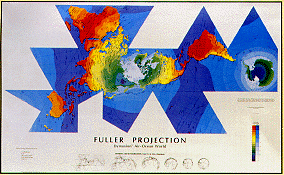
Promises to generate discussions in your
home and office.
GENI Mission —
GENI is a tax-exempt 501(c)(3) corporation
committed to improving the quality of life
for everyone without damage to the planet.
|
Two decades
ago, the late R. Buckminster Fuller
proposed interconnecting regional power
systems into a single continuous global electrical
energy grid. • While this vision is still years
away, tech-
nological advances have made the linking of
international and
inter regional energy networks practicable today.
• Transmission
lines allow utilities to level the peaks and
valleys of demand. This is
accomplished between East-West time zones, as
well as North-South
seasonal variations in demand. • The origin
of the energy grid initiative
emerged as the highest priority of the World
Game™. Its stated purpose
is “to make the world work for 100% of humanity
in the shortest possible
time through spontaneous cooperation without
ecological damage or the
disadvantage of anyone.” Research reveals that
these major benefits will
result from expanding electrical networks. •
Increase in everyone’s stan-
dard of living • Reduction of fossil fuel demand
and the resultant pollu-
tion • Relief of the population explosion •
Reduction of world hunger
• Enhancement of world trade • Promotion of
international
cooperation and peace • The purpose of GENI,
Global
Energy Network Institute, is to educate all
people,
especially world leaders, to the potential
benefits of this global
solution. •
|
|
"Never doubt that
a small group of thoughtful, committed citizens
can change the world; indeed, it's the only
thing that ever has."
Margaret Mead
|

How can I support
GENI?

|





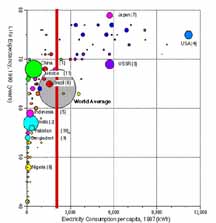
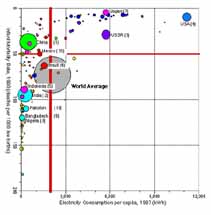
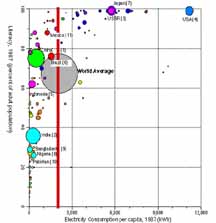
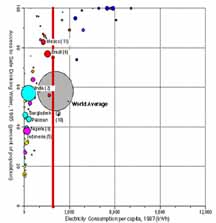
 1995
is the 100th year since the birth of Dr. R. Buckminster
"Bucky" Fuller on July 12, 1895.
1995
is the 100th year since the birth of Dr. R. Buckminster
"Bucky" Fuller on July 12, 1895. Dymaxion™
Globe
Dymaxion™
Globe
